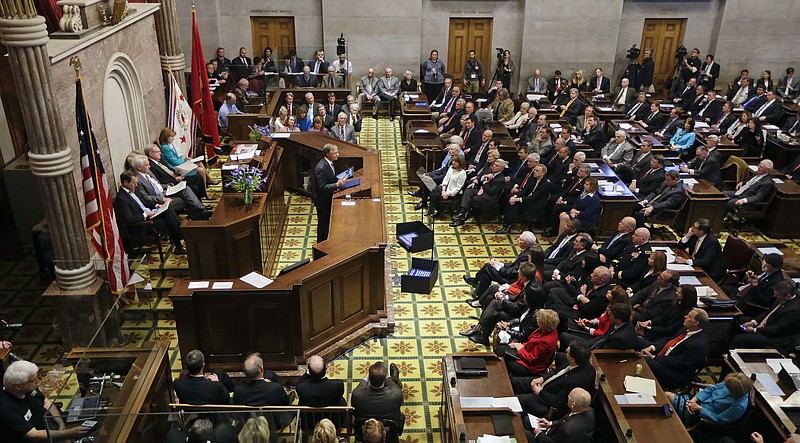With 2016 not only an election year for most members of the Tennessee General Assembly but also a presidential election year, the public should expect very little controversial legislation to be passed in the upcoming legislative session in Nashville.
Oh, some of it will be discussed in committees or on the House and Senate floors, but with voters paying a little more attention and presidential politics poisoning the air, legislators will tread lightly.
It'll be no different in Washington, D.C., where politics and little compromise will rule a Congress with a House and Senate of one party and the president of another party and in the last year of his tenure.
"It's an election year and obviously, a lot of the legislative process is going to be skewed by people looking over their shoulders, worrying about primaries, trying to position themselves relative to the presidential candidates. So that makes it harder," President Obama said in an end-of-the-year news conference.
Members of the Chattanooga delegation of the Tennessee General Assembly echoed similar thoughts in a roundtable discussion with Chattanooga Times Free Press reporters and editors last week.
"It's a difficult political climate," state Rep. Patsy Hazlewood, R-Signal Mountain, said about one issue but reflective of the discussion on a broad range of legislation.
That's the case in Tennessee even when 73 of 99 House members, 28 of 33 Senate members and the governor are all of the same Republican party. And it's because the state is not as Republican as its General Assembly and the mayors of its influential four largest cities are Democrats.
Among the issues ripe for discussion this session but less likely to pass are changes in the state-shared sales tax plan, changes in broadband rules, in-state fees for qualifying illegal immigrant college students, school vouchers, and the recognition of traditional marriage as the law of the state and the prevention by the state from enforcing the Supreme Court rule allowing gay marriage.
A revival of Insure Tennessee, an increase in the gas tax to help fund highway repairs and the passage of a workable medical marijuana law aren't likely, either.
Instead, much of the legislation will have to wait until 2017 after a new General Assembly is elected in November and a new president of the United States gives an indication of which way the White House political winds will be blowing for the next four years.
On some of the Tennessee legislation, there's more at stake than an up-and-down vote.
On state-shared sales tax changes, for instance, Hamilton County Mayor Jim Coppinger and others would like their unincorporated residents to get a piece of the pie that only municipalities currently share from sales tax revenue.
Hamilton County legislative delegates are sympathetic to the argument, especially since many municipalities across the state are no longer in the school business for which the money was originally directed, but they also don't want to see the cities and towns lose large chunks of their revenue.
Contributing to the problem is the collection of the Hall tax, three-eighths of which goes to local municipalities or counties in which the taxpayer lives. If, as many legislators have wanted for years, the Hall tax is reduced or eliminated, and the state-shared sales is reconfigured, municipalities could be in a world of hurt.
"We're still in the conversation, the research stage," state Sen. Bo Watson, R-Hixson, said. "This will not be settled in a short time. We need to take our time. Timing is everything."
"I don't think it will [happen] this year," state Rep. Gerald McCormick, R-Chattanooga, the House majority leader, said.
The same is true for broadband changes, where some legislators would like to permit municipal Internet providers to expand into rural areas.
Despite what Watson said were "serious conversations going around" on the issue, studies on Internet accessibility throughout the state and on best practices in other states may delay changes until 2017.
It's reasonable, he said, to believe "a more comprehensive piece of legislation will develop once these studies are back."
"Next year, all parties will probably be able to come to the table," McCormick said. "It'll probably be next General Assembly."
The bill allowing illegal immigrant students to pay in-state tuition at state colleges and universities passed the Senate during the 2015 session but failed by one vote in the House.
"The national media has focused so much attention [on immigration]," said state Sen. Todd Gardenhire, R-Chattanooga, who sponsored last year's Senate bill. "It will be campaign fodder for opponents of my bill [in 2016].
"I hope," he said, referring to Republican presidential candidate Donald Trump's harping on immigration, "I don't get Trumped."
"I suspect," said McCormick, "it will not happen this year."
In Washington, similarly, Congress, citing the election year, reportedly has pushed discussion of comprehensive tax reform to 2017 and may delay discussion of the Trans-Pacific Partnership deal until after the November election.
In other words, in Tennessee and in Washington, D.C., politics as an election-year interloper is now politics as usual.
